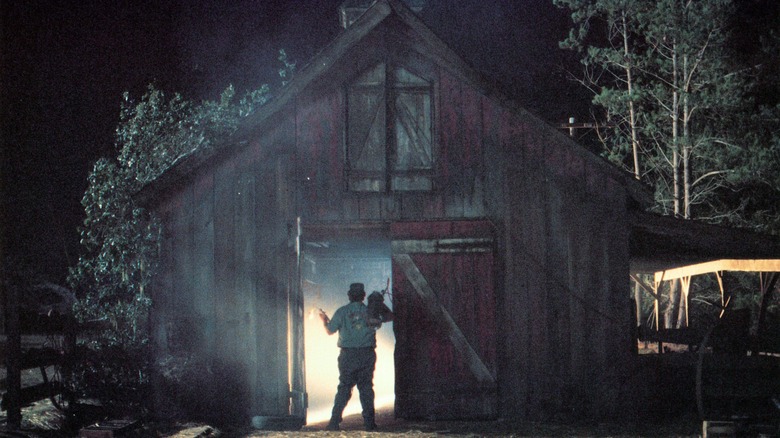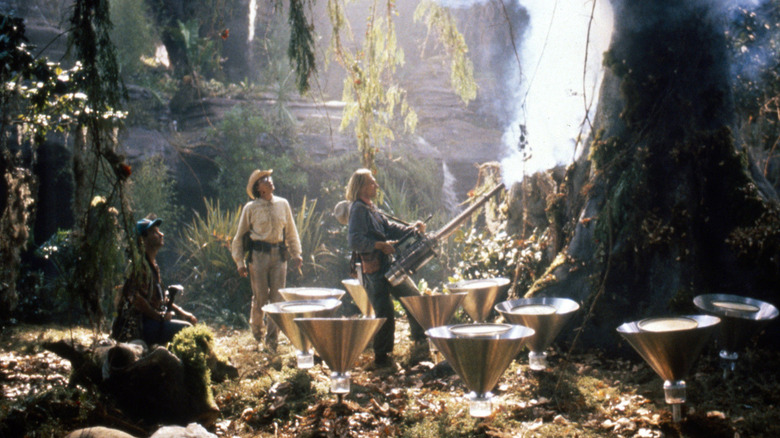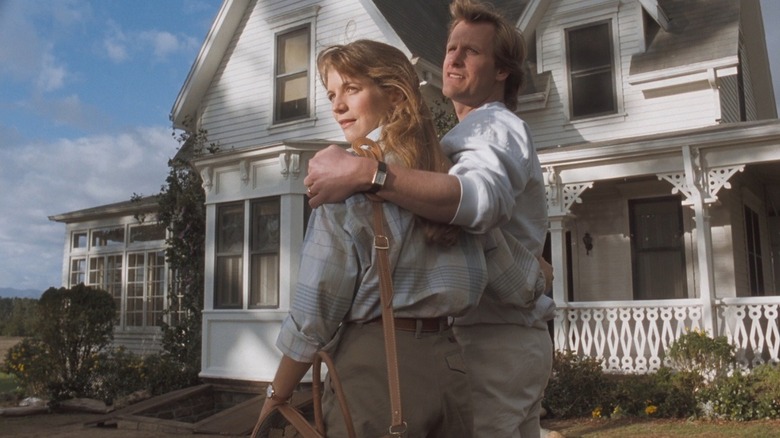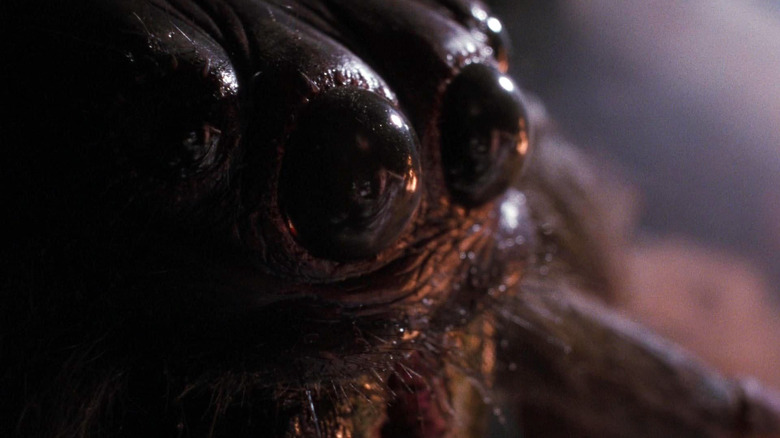All Of Arachnophobia Is Terrifying, But This Scene Is One Of The Scariest Ever
(Welcome to Scariest Scene Ever, a column dedicated to the most pulse-pounding moments in horror with your tour guides, horror experts Matt Donato and Ariel Fisher. In this edition: Ariel discusses a truly traumatic scene in Frank Marshall's "Arachnophobia" that gave her arachnophobia, and Matt gets to weigh in after his first viewing.)
"Arachnophobia" is one of those movies that pulls from its predecessors to elicit viscerally terrifying end results with perfect tension release. Part "Jaws" meets "Kingdom of the Spiders" by way of "The Birds," it preys on some of our base fears that often get relegated to "cute" answers about phobias.
Having already talked about megalohydrathalassophobia, today I'm looking at an eight-legged phobia that's stuck to my ribs since I first saw this movie at the age of 7. The humor is not lost on me that I developed arachnophobia from watching "Arachnophobia."
When my brother and I were growing up, the only family vacations we really took were to this small, family-owned set of cottages on Lake of Bays in Muskoka, Ontario. We started going there when I was about 3, and over the years our family made friends with other families. We played with their kids while our parents hung out for the same two weeks every summer. It was my favorite place in the world.
Two of our friends up there, Emma and Chris, were siblings, and, unlike us, they were allowed to watch movies while they were up north. Their parents brought a small TV and their VCR from home and they'd rent movies at the marina/convenience store/video store up the road. One night, they rented "Arachnophobia," and since it's technically a comedy, none of the parents thought it would be a big deal. My brother and I walked over to their cabin to watch it one night while their folks played cards with ours. We walked back alone in the dark (as one does when the walk is a minute and a half), and went straight to bed.
That night I had two of the most traumatic nightmares of my life.
Our room had these rickety bunk beds, and I always got the bottom bunk. Well, I woke up in the middle of the night and couldn't move. It was like a waking nightmare. I looked down at my body and was covered from head to toe in Avondale spiders (the harmless species used for all the drones in the movie). Thousands of them. I shot up out of bed screaming and ran to my parents' room.
They calmed me down, took me back to bed, and reassured me there was nothing there. It was just a bad dream. So I went back to sleep.
A little while later, I woke up again, only this time it looked like my entire lower bunk was covered in thick spiderwebs, blocking every opening, cocooning me in my blankets, covering my face. Again, I couldn't move. Once I fully woke up, I ran screaming to mom and dad. They put me back to bed.
My brother didn't wake up once.
I can't watch this movie without shaking from head to toe, even now in my 30s. And while the bathroom scene still makes me ultra-paranoid, it's the grand finale that's one of the single most terrifying scenes, ever.
The Setup
After a photographer on a special assignment in Venezuela gets killed by a highly venomous spider, the eight-legged behemoth hitches a ride back to the States with his body. Once they arrive back in his hometown of Canaima, California, the male spider makes a nest in the barn the new town doctor, Ross Jennings, whose family just moved in. The spider starts a family of his own with a female spider from the area, and their significantly smaller spawn progressively sprawl all over the town, stealthily killing its unwitting citizens.
The Story So Far
While on assignment in Venezuela, photographer Jerry Manley (Mark L. Taylor) was swiftly killed by a new, and highly venomous, species of spider. When his body was sent back home, the offending arachnid (we'll call him the General) hitches a ride in his coffin all the way back to the States. Through Goldbergian circumstance, the General makes his way to the property of the new town doctor, Dr. Ross Jennings (Jeff Daniels), whose family has just pulled up to their brand new home. They left the city behind in favor of the quiet country life, where Dr. Jennings could start his medical practice by taking over for the geriatric Dr. Sam Metcalf (Henry Jones) who's looking to retire.
Well, he was, anyway.
The good doctor changed his mind, leaving Ross stuck with only one patient — his witty neighbor, Margaret Hollins (Mary Carver). After throwing Ross a welcome party, Margaret gets bitten by one of the General's significantly smaller offspring, dying almost instantly. When Dr. Metcalf comes to inspect the body, however, he refuses to allow an autopsy, claiming medical malpractice and making Ross responsible for her death.
The local football coach tries to help Ross out by having him do the team's routine checkups. But during practice, one of the new younglings sneaks into a teen's helmet, biting him behind the ear. He dies in seconds during a tackle.
Having earned the nickname Dr. Death, no one will go near him. That is until Dr. Metcalf gets bitten and dies in front of his wife. Now the only doctor in town, Ross gets the go-ahead from the local coroner, Milt Briggs (James Handy), to have Dr. Metcalf's body thoroughly examined, autopsy, toxicology report and all. The results are enough to grant him the right to exhume the bodies of Margaret and the teenager for full examinations, where they find matching bites on all three victims.
Having reached out to the foremost authority on spiders on the West coast, Dr. James Atherton (Julian Sands), Ross works alongside Atherton, his assistant, Chris Collins (Brian McNamara), the local exterminator, Delbert McClintock (John Goodman providing the film's signature comic relief), and antagonistic Dudley Do-Right Sheriff Lloyd Parsons (Stuart Pankin) to find the nest.
The initial assumption is that the nest is at the morgue, where Jerry Manley's body was sent. In actual fact, it's in the Jennings' barn.
The Scene
(Here are the second and third parts of the finale.)
Ross, Chris, and Delbert pull up to the house and immediately split up, the exterminator taking the barn while Chris and Ross slowly come inside to help his family, careful not to make any sudden movements. Without wasting much time, one spider crawls across the TV screen being watched by Molly Jennings (Harley Jane Kozak) and their kids in the living room. Suddenly, several more are crawling out from around the window sill into the living room. Every few seconds, another dozen show up, and then another, and before they know it, the family and Chris are scrambling up the stairs, the walls suddenly turning dark brown as they're covered in spiders.
Ambushed and with no safe way to leave the house, they barricade themselves in the upstairs bathroom. But doors are no match for these spiders, as they force themselves through the cracks around the doorknob and under the door frame, climbing through the vents, and dangling from the ceiling to block off the window. Molly, the kids, and Chris escape safely, but Ross is trapped with no way out. Surrounded.
He pushes his way out of the bathroom as dozens of spiders jump on him from the ceiling, forcing him over the edge of the banister, falling straight through the rotten floorboards directly into the cellar. The dark, musty, cool cellar, where the Queen is guarding a new nest full of the next generation of arachnoid killers. The Queen lunges at Ross in the dark, only to get swiftly fried against the circuit breakers.
Ross sees the egg sack hanging in the corner, a sickly grey, pulsating, lumpy blob. He tries to destroy it — death by Cognac and a lighter — as the General rears up like a bear ready to attack, sending him reeling backward, trapping him under a toppled wine rack.
A seemingly relentless battle ensues, each trying to outsmart the other. In the end, the General is catapulted into the fire only to get his very own Debbie Salt/Mrs. Loomis-esque moment and lunge at Ross one last time. A perfect shot from a nail gun sends the General screaming into his own nest, engulfing it and destroying the remaining offspring.
The Impact (Matt's Take)
The only reason I've now seen "Arachnophobia" is because Ariel selected this precursor to "Eight Legged Freaks" and "Big Ass Spider" — two spider comedies I consequently adore — and I'm a professional. Why the blind spot? My horror-hating household wasn't frequenting the scariest section of our local Blockbuster, and more importantly, I never enjoyed arachnids all that much. Hell, I'd force my mom to flip through new issues of Ranger Rick for any magazine spreads of endangered spiders because, well, absolutely 'effing not.
Is it clear why I avoided "Arachnophobia" until now?
There's something to be said about the "therapy" angle Jennings' wife assures will lessen his paralyzing arachnophobia, because I found the film rather astounding in terms of technical complications. There was a lump in my throat when I pressed play on "Arachnophobia" — would it be the uncomfortable, nerve-gnashing experience I'd built up in my head over time? It wasn't, but only because I'm in my thirties now and have been exposed to spiders for decades.
Watching "Arachnophobia" as a child would have scared me away from barns, woodland areas, or anywhere other "Generals" could lurk. Watching "Arachnophobia" now? I'm more in awe of the "spider acting," or rather appreciative of its blend of predominantly humorous and exquisitely terrifying wildlife horror.
All that being said, the entire finale is, and will forever remain, nightmare material.
Avondale spiders overflowing from behind keyholes and bathroom fixtures is something that's impossible to forget. As Jennings bats away dangling invaders that have become venomous decorations, my skin itched and my body twitched. That paralysis Jennings and Ariel both explain is something I've endured as my own sleep paralysis, so the prolonged shot of the General inching across Jenning's body — the camera so manically cutting to the General's beady eyes as they vengefully glisten — is despicably relatable because that helplessness, that powerlessness, sucks.
The stinging sensation behind "Arachnophobia" is its authenticity in environmental terror, which drives every element of these sequences home even harder. What a fine, fang-sinking experience that I can't wait to relive.



